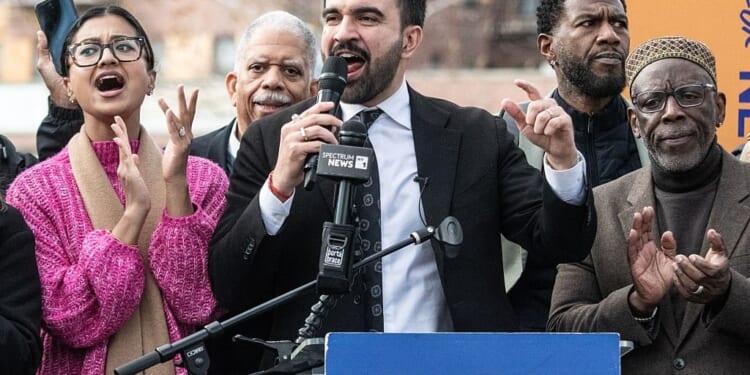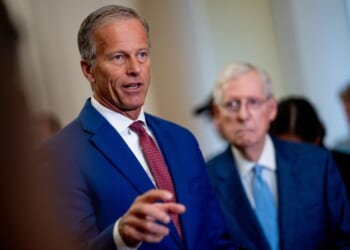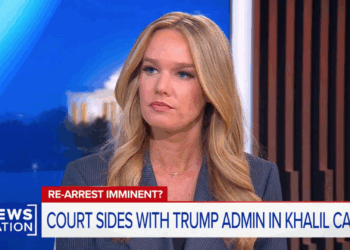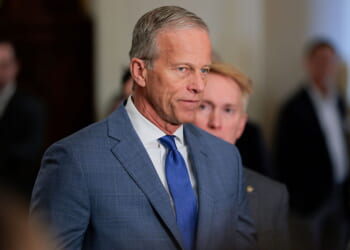For nearly a year, the Democratic Party has stumbled around the political wilderness, often doubling down on far-left issues that most Americans aren’t concerned with, which could be why some view the party as weak, woke, and out of touch. As it continues to miss the forest for the trees, a few groups are jockeying to transform the party – or overtake it – each with wildly different ideas.
One campaign is led by a millionaire founder looking to unseat Rep. Nancy Pelosi (D-CA) and build a populist uprising. The second is a movement spearheaded by the New Liberals, whose primary goal is to reorient the party with an “abundance” agenda, practicing “pragmatism over populism.” The third, however, is a well-organized operation to take over the party and use it as a vehicle, a Trojan Horse of sorts, to install socialism nationwide and “take the empire down from within.”
A Cuckoo in the Democratic Party
Based on the name, the Democratic Socialists of America (DSA) might seem like a friendly organization to many leftists, but its motives suggest otherwise. “They are an external force that has infiltrated the Democratic Party to reshape it in their own image,” explained Canary Mission, a website focused on documenting people and organizations that promote antisemitism and hatred of the US. “Like the cuckoo that lays its eggs in another bird’s nest and then throws out the original bird’s eggs, the DSA is using the party’s structure and reputation while working to replace it with its own extremist agenda.”
The DSA gathered in August for its biennial convention and spent much of the time praising Zohran Mamdani, a self-described democratic socialist who is expected to win the New York City mayoral race this week. Delegates see his campaign as a template for future candidates. The Washington Free Beacon attended the event and said the DSA “sent a clear message to Democrats”: “We’re in charge now.”
“The time for protest campaigns and messaging is over,” said Nate K., a delegate from Atlanta. “The time for winning is now. We can win the Democratic primary in 2028.”
The DSA and its NYC chapter are “deeply integrated” with Mamdani’s campaign, said Jeremy Cohan, former co-chair of NYC DSA. At the convention, he led a special session on “winning campaigns” and said he believes “the foundations for a Zohran exist in all of our chapters.” Mamdani is just a stepping stone to the ultimate goal.
“U.S. imperialism is not a thing that can be reformed away,” said DSA leader Hazel Williams in an Instagram reel. “It has to be overthrown through revolutionary struggle.”
Endorsements from the DSA’s NYC chapter are in high demand, according to Politico. Since Mamdani’s primary win, more than 50 candidates have “sought the socialist seal of approval.” The movement is clearly growing and becoming more accepted. The Cato Institute released a survey in the spring that found 62% of Americans aged 18 to 29 hold a “favorable view” of socialism, and 34% expressed the same opinion of communism. Though NYC is not representative of the rest of America, Mamdani’s rise raises questions about where the country might be headed and where the youth of today will take it. Many Americans today appear disaffected, dissatisfied, and maladjusted, frustrations that the DSA is likely eager to exploit.
A ‘MAGA Moment’
Does anybody remember the Justice Democrats, the progressive group that caused a ruckus on the left in 2018 when threatening to primary Democratic incumbents who were perceived as too moderate? It also orchestrated the rise of Rep. Alexandria Ocasio-Cortez (D-NY), helping her defeat former Rep. Joe Crowley. A cofounder of the group, Saikat Chakrabarti, went on to serve as AOC’s chief of staff for eight months and now has his eyes on Rep. Nancy Pelosi’s seat (D-CA). His long-term goal, however, is to hijack the Democratic Party: out with the old, in with the new.

Chakrabarti is in the process of organizing as many like-minded candidates as possible, people who share his eagerness to upend the Democratic establishment. He wants to get enough insurgents to run for every seat in the House, a lofty goal, no doubt, but he believes the weak state of the Democratic Party makes it ripe for a populist uprising – similar to the GOP’s Tea Party revolt, said his sidekick and campaign manager, Zack Exley. But a better analogy, he told Politico, is “This is like our MAGA moment.”
Chakrabarti helped build the payment processor Stripe and is worth around $100 million, so money is not an issue. Executing his vision successfully might be a different story. He has a 10-year plan put forward through a think tank he founded in 2017 called New Consensus. It includes a progressive overhaul of the US economy and building high-speed rails, a nationwide EV charging network, and long-distance aqueducts. He also wants to tackle global climate change and wishes to store clean hydrogen energy in salt caverns – no joke.
Much of his agenda may seem impossible and unrealistic, but that is no reason to discount him. He’s familiar with the political landscape and has financial resources. Democratic voters and politicians seem hungry for somebody or something to latch onto right now, perhaps a charismatic person whose ideas require wishful thinking. Maybe Chakrabarti could be the next Mamdani and sweep daydreaming Californians off their feet.
New Liberals, Old Tricks
Next is the Center for New Liberalism (CNL), a grassroots advocacy organization that originated in a Reddit politics forum (r/neoliberal) in 2017. Cofounded by Jeremiah Johnson and Colin Mortimer, CNL is now part of the Progressive Policy Institute (PPI), a centrist think tank that was influential during the New Democrat movement of President Bill Clinton.
At the center of CNL’s policy proposals is an “abundance” agenda, which has become more popular since the publication of Abundance by Ezra Klein of The New York Times and Derek Thompson, a former staff writer at The Atlantic. “Abundance” focuses on expansion, “more plentiful and cheaper housing and energy, more public transit, better infrastructure, and greater scientific and medical innovation,” explained The Dispatch. Of course, administrative burdens hinder such actions, especially in blue states. New Liberals want to unshackle the government, in a sense, to make building easier and more productive, avoiding fiascos like California’s attempt to create a high-speed rail.
CNL sees the abundance agenda as the answer to strengthening the Democratic Party and making the government more efficient. Its agenda appears less aggressive than Chakrabarti’s and aims to influence rather than overtake the party. Still, neither comes close to the hostile takeover the DSA seems to be planning, yet all three appear eager to reorient the Democratic Party into its own ideals. But only one ostensibly wants to use the party as a vessel to seize the means of production and turn America into a collective society. In order for any of these movements to gain momentum, though, the necessary people must get elected, and established Democrats would have to move out of the way. Easier said than done. The more likely scenario is that the left will continue chasing its tail in the political wilderness while doing its best to ensure nobody creeps in and disrupts the status quo.

















